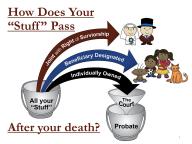|
Wednesday, December 7, 2022
 We are now living in “The Sandwich Generation” era. The Sandwich Generation refers to those caregivers, generally between the ages of 45 and 59, who are caring for aging parents while also caring for young children or dependent young adult children. One of the issues facing many of those caregivers is how to pay for the aging parent’s long-term care needs. Long-term care refers to ongoing assistance to meet some of the basic activities of daily living, such as bathing, eating, dressing, using the toilet, transferring from bed or chair, caring for incontinence or eating. The type and cost of long-term care depends on the services necessary for the health and safety of the person.
Read more . . .
Wednesday, September 14, 2022
 Mary, an independent, strong-willed woman all of her life, realized that she might need help managing her finances. She came to me with concerns that her memory might be slipping a little, and she was afraid that she might forget to pay her bills. After assuring her that she was fine, I encouraged her to consider placing her assets in a trust so that she could write her own rules for management of those assets. Mary was skeptical. “Trusts are way too complicated for me! I don’t even know what a trust is. Read more . . .
Tuesday, August 30, 2022
 Mary has several businesses, a real estate partnership with one other person, another business organized as a Limited Liability Company of which she owns 51%, and a third business organized as a corporation which Mary owns 50% of the shares and her brother owns the other 50%. Mary has three children, two are well into adulthood, but her youngest is 17 and will be starting college next year and plans to study medicine after she completes her undergraduate degree. Her oldest child, Lindsey, has been working in Mary’s LLC for several years, and has expressed interest in becoming an owner at some point in the future. The other adult child, Hunter, has no interest in working in any of the businesses.
As a single mother, Mary is concerned about what will happen to her businesses because they are her main source of income and her largest assets. Read more . . .
Tuesday, July 19, 2022
 Parents want their children to be taken care of after they die. But children with disabilities have increased financial and care needs, so ensuring their long-term welfare can be tricky. Proper planning by parents is necessary to benefit the child with a disability, including an adult child, as well as assist any siblings who may be left with the caretaking responsibility. Parents want their children to be taken care of after they die. But children with disabilities have increased financial and care needs, so ensuring their long-term welfare can be tricky. Proper planning by parents is necessary to benefit the child with a disability, including an adult child, as well as assist any siblings who may be left with the caretaking responsibility.
Special Needs Trusts
The best and most comprehensive option to protect a loved one is to set up a special needs trust (also called a supplemental needs trust). These trusts allow beneficiaries to receive inheritances, gifts, lawsuit settlements, or other funds and yet not lose their eligibility for certain government programs, such as Medicaid and Supplemental Security Income (SSI).Read more . . .
Wednesday, June 22, 2022
7243.jpg) ABLE (Achieving a Better Life Experience) accounts offer people with disabilities a great, tax-free way to accumulate money without jeopardizing their qualifications for Supplemental Security Income (SSI) and other means-tested programs. Withdrawals are tax-free as long as the money is used for “qualified disability expenses.” The arguments for starting and maintaining such funds are overwhelming, not least of which is the wide variety of things on which the money can be spent. To build 529A ABLE accounts, beneficiaries (and other contributors) can put up to $16,000 total into these funds each year. Read more . . .
Friday, April 8, 2022
 Last month, we introduced our year-long project to organize our estates. How did you do? Did you check all the boxes? As with most projects, sometimes getting started is the real goal, so give yourself a gold checkmark if you did anything to start getting your estate in order. This month, it is time to make sure we have legal documents in place to protect in case we become unable to make or communicate significant decisions about our healthcare or our finances. Years ago, I had a potential client whose daughter called my office several times to make appointments for him to get his estate planning documents prepared. As each appointment time approached, he called my office to cancel.
Read more . . .
Thursday, March 31, 2022
In Georgia, a guardian is the term used for the person responsible for managing affairs related to the health and safety of the ward, while a conservator is responsible for the financial affairs of the ward. Ward is the term used for someone who has a guardian or conservator. The relationship of the guardian or conservator to the ward is similar to that of a parent to a minor child. The judge of the probate court in the county in which the ward resides or can be found appoints guardians and conservators. When a guardian or conservator is appointed, the ward loses many rights. Read more . . .
Wednesday, February 10, 2021
 What should you do when a loved one dies? How and when does the estate get administered? Administration is defined as Court-supervised distribution of an estate during probate. Also used to describe distribution process for a trust. Probate means proving the will, but it can also be used to indicate a court process to handle a deceased person’s estate. When a loved one dies, there is often confusion and panic about what legal and financial steps should be taken by survivors. There may be little information about the finances of the decedent, and spouses or children are left to sort through what may seem like a never-ending mass of papers. Read more . . .
Friday, February 7, 2020
 My favorite hobby is reading and I try to combine my love of reading with my profession of estate planning. The plots of some of my favorite books are about dysfunctional family relationships complicated by really bad estate planning!Here are three books I recommend where siblings were torn apart by their parents’ bad estate planning choices.The Nestby Cynthia D’Aprix SweeneyThe four siblings of the Plumb family - Leo, Melody, Beatrice, and Jack- are the beneficiaries of a trust fund they call “The Nest” left to them by their father. The terms of the trust provide that the trust assets will be distributed equally to the four siblings when the youngest, Melody, reaches age 40. When the book begins, Melody is fast-approaching her 40th birthday, and each of the siblings is anxiously awaiting the distribution that could solve their self-inflicted life problems.
Read more . . .
Monday, November 11, 2019
There are not enough hours in the day – a familiar phrase I mutter to myself while trying to accomplish the items on my ever-expanding to-do list. That phrase may really be true for those caring for a family member with disabilities. Although I haven’t found a way to add hours to my day, I have found ways to extend the time available for learning new things. I’ve discovered that I can listen to podcasts and books while doing tasks that require my physical -but not necessarily my mental – presence. I listen to podcasts when I’m running, doing laundry or cooking, or while I’m wandering around Trader Joe’s picking up groceries. Read more . . .
Thursday, June 22, 2017
 Jennifer’s 80-year-old mother seemed to be running low on funds every month. By the end of the month, she had no money for groceries. Jennifer had helped her mother with a budget, so she thought her mother had plenty of money to make it through each month. When she asked her mother to allow her to look at her bank statements, though, Jennifer discovered a series of automatic debits to several companies she did not recognize. It turns out, her mother had signed up for monthly book delivery clubs, as well as recurring magazine subscriptions for magazines Jennifer knew her mother did not read. Read more . . .
The Elrod-Hill Law Firm,LLC assists clients with Estate Planning, Veterans Benefits, Medicaid, Elder Care Law, Probate, Special Needs Planning and Pet Trusts in the North Atlanta area including the counties of Dekalb, Gwinnett and Fulton.
|

|
|
|